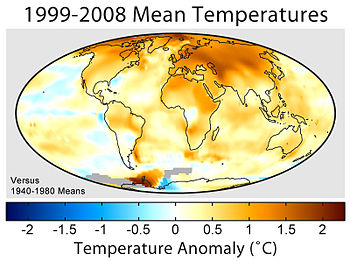 |
| Mean surface temperature change for 1999–2008 relative to the average temperatures from 1940 to 1980 (Photo credit: Wikipedia) |
How Culture Shapes the Climate Change Debate [Kindle Edition] (120 pages, Andrew Hoffman, Mar. 11, 2015)
Key Quotes:
“the key to engaging the debate is addressing the deeper ideological, cultural, and social filters that are triggered by this issue.”
“These conversations have become a rhetorical contest, one where opposing sides try to achieve victory through playing on fear, distrust, and intolerance. At its heart, this split no longer concerns carbon dioxide, greenhouse gases, or climate modeling; rather, it is the product of contrasting, deeply entrenched worldviews.”
“While physical scientists explore the mechanics and implications of a changing climate, the social scientist explores the cultural and cognitive reasons why people support or reject their conclusions”
“scientists tried to explain that the issue over climate change is about global temperature increases, not regional weather deviations, and that one weather event does not prove or disprove the science…the odds are that we can expect as a result of global warming to see more of this pattern of extreme cold in the mid-latitudes and some extreme warm in the far north” [concerning the 2014 Polar Vortex]
“Physical scientists are mystified and frustrated by this state of affairs. But it makes sense to social scientists from disciplines like psychology, sociology, anthropology, political science, ethics, and philosophy, who offer valuable tools, first for understanding why people take such polarized views on controversial issues and then for moving beyond the rancor”
“Four points that have to be addressed:
• there is a vast physical infrastructure around fossil fuels and the lifestyle they create, which cannot be replaced easily.
• there are strong economic and political interests that are threatened by the issue of climate change …As a result, they have adopted strategies to confuse and polarize the debate in order to protect their interests.
• Efforts to change cultural views on climate change must include changing the vast institutions and infrastructure of our economy and
• be prepared to deal with resistance from those who benefit from them”





No comments:
Post a Comment